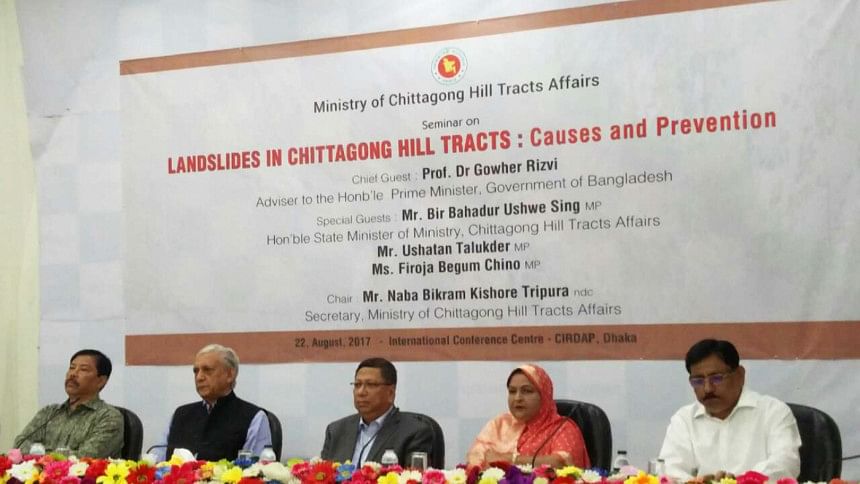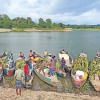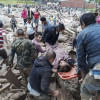Landslides in Hills: Causes mostly man-made

Man-made causes contributed largely to the recent landslides in the Chittagong Hill Tracts and a political commitment is required to address those causes for averting disaster in the region, say experts.
They also recommended formation of a comprehensive hill land use policy and construction code for building infrastructure, including roads, in the hilly districts.
At a seminar, titled “Landslides in Chittagong Hill Tracts (CHT) -- Causes and Prevention”, in the capital's CIRDAP yesterday, the experts said without addressing the man-made causes, it would be impossible to prevent disasters like the June 13 landslides that left over 160 people dead.
They identified hill cutting, unauthorised human settlements, deforestation, faulty infrastructure construction and change in agricultural and forest activities as the main man-made causes behind the landslides.
Natural causes like heavy rainfall, effects of earthquake and climate change were also to blame, they said.
Speaking as the chief guest, Prime Minister's International Affairs Adviser Dr Gowher Rizvi stressed the need for establishing coordination among the relevant agencies to address the matter.
He emphasised on understanding the hill ecology before implementing or even taking up any plans for the areas.
State Minister for CHT Affairs Bir Bahadur Ushwe Sing expressed anger at the lack of coordination among the ministries and departments concerned in dealing with the aftermath of the landslides.
He went heavily on the disaster management ministry for failing to meet the needs of the victims after the June 13 disaster.
Ushwe Sing said 23 to 26 crore bamboo shoots, among other plants, would be planted as part of efforts to afforest the areas.
Presenting the keynote paper, M Shahidul Islam, professor of geography and environment at the Dhaka University, said the natural causes of landslides could not be prevented, but the man-made causes, including massive scale hill cutting and unauthorised settlements, could be controlled.
“To do so, a strong political commitment is a must,” he said.
Prof Samjwal Ratna Bajracharya, a Nepalese geologist and remote sensing specialist, highlighted the need for taking up “bio-engineering and civil engineering” measures to lower the risks of future disasters in the region.
He said a storm water drainage system was necessary in the region to ease water flow beside roads.
Lt Col (retd) Parimal Bikash Chakma, a UNDP hills security adviser, suggested eviction of vulnerable human colonies from the hilly areas to avert loss of lives in landslides.
Rangamati Deputy Commissioner Manzurul Mannan demanded that the government properly equip the fire service and civil defense for rescue operations in the region.
He alleged that no warning was given to the hill districts ahead of June 13 landslides.
“Had we received warnings from the department concerned we could have saved many lives by alerting them much before the disaster,” he said urging the government to rehabilitate the people who have been staying at shelters in Rangamati.
The DC also demanded immediate construction of more shelters in the three hilly districts -- Rangamati, Bandarban and Chittagong.
Among others, lawmakers Ushatan Talukder and Firoja Begum Chino also spoke at the seminar chaired by Naba Bikram Kishore Tripura, secretary of the CHT Affairs ministry.
Several officials from NGOs and fire service department also spoke on the occasion.

 For all latest news, follow The Daily Star's Google News channel.
For all latest news, follow The Daily Star's Google News channel. 








Comments